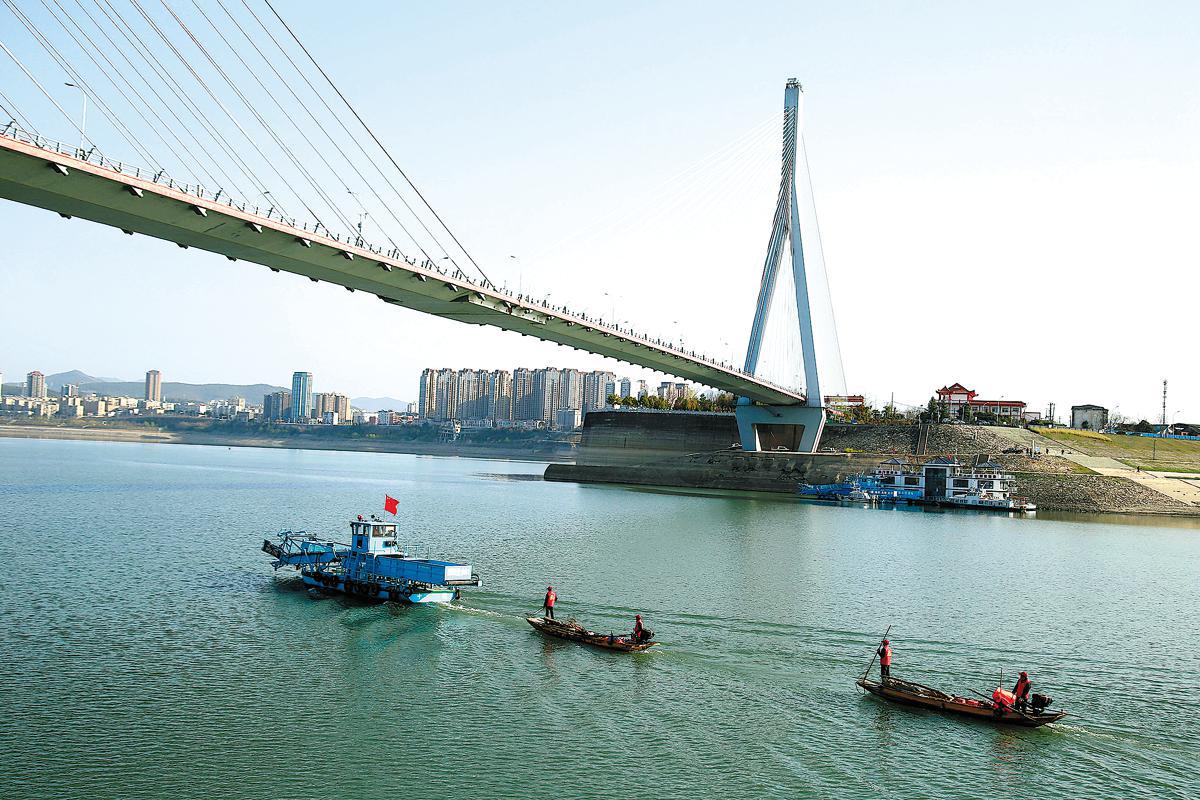
 0 Comment(s)
0 Comment(s) Print
Print E-mail China Daily, March 25, 2025
E-mail China Daily, March 25, 2025
Cleaners collect garbage on the Hanjiang River, a major source of water for the South-to-North Water Diversion Project, in Shiyan city, Hubei province, on March 21, 2025. [Photo/China Daily]
China has made remarkable progress in rejuvenating its waterways as it endeavors to uphold "river ethics", seeking to safeguard the rights of rivers for sustainable existence.
The latest progress was shared at the 2025 World Water Day Open Day in Beijing's Tongzhou district on Saturday, where the northernmost section of the famed Beijing-Hangzhou Grand Canal is located.
Addressing the event, Peng Jing, president of the China Institute of Water Resources and Hydropower Research, said the theme of this year's event was about celebrating the living heritage of artificial waterways such as the Beijing-Hangzhou Grand Canal.
The canal is the world's longest and oldest artificial waterway that is still in use today. But due to reasons such as changes in river course and poor maintenance, this ancient waterway that once connected five major rivers has been disconnected for the past century.
In 2022, the Chinese government launched an initiative to bring life back to the more than 1,700-kilometer Grand Canal with water from the South-to-North Water Diversion Project.
Over the years, the project has transferred billions of cubic meters of water from the south to supplement the dry and populous north. Thanks to the diversion, water systems in the north can recover from overuse, people have better quality water to drink and from 2022 on the disconnected canal has resumed full flow, Peng said.
It's encouraging to see the modern artificial waterway support the ancient canal, which dates back nearly 2,500 years, and revitalize natural rivers and people who depend on them, she said. It demonstrates the co-dependent relationship between humans and water.
"I believe the story of the Grand Canal proves one simple thing: That harmony between humans and water is achievable. By protecting, passing on and harnessing the flowing legacies, humans are given a chance to survive our current crises and grow further," she noted.
Li Haihong, who heads IWHR's technical team for the river ethics program, said that the resumption of full flow in the once disconnected sections of the Grand Canal is an example demonstrating China's commitment to the practice of river ethics. "River crises occur because humans have emphasized their rights during development while neglecting their duties, leaving the rights of rivers unprotected. Constructing river ethics is about strengthening human responsibilities and duties and protecting the rights of rivers," she said.
Li said the canal used to play a vital role in promoting the economic and cultural development and exchanges between the country's north and south, and people and the canal once lived in harmony.
Since 1855, however, the northern section of the canal had ceased to flow, making it lose its vitality, she said.
Since 2022, more than 800 million cubic meters of water has been diverted to the canal, restoring its vitality. Over 300 million cubic meters of water has been diverted to irrigate more than 53,300 hectares of farmland along the canal, replenishing the groundwater.
Li noted the Xiliao River in Northeast China, which is the only major river among China's seven largest rivers with an interrupted flow, as another example demonstrating China's commitment to river ethics.
Thanks to a 2020 initiative to supplement rain water and floodwater into it, the watercourse has had water in its trunk for the last five years, she said.
According to a recent release from the ministry, its efforts to supplement water in the Yongding River, which dried up in 1996, has also significantly rejuvenated the mother river of Beijing. The river has seen water flow continuously along its entire length for five straight years since 2021, it noted.
River ethics were included in one of four initiatives proposed by China's Minister of Water Resources Li Guoying in March 2023 during the 10th United Nations Water Conference. "We should respect the right of rivers to survive in nature, treat water as a living entity, develop river ethics, protect river health and achieve a harmonious coexistence between humans and rivers," he said.
The minister has been advocating for river ethics at least since 2009 when he headed the Yellow River Conservancy Commission, an affiliate of the ministry that oversees the management of the Yellow River, China's mother river.